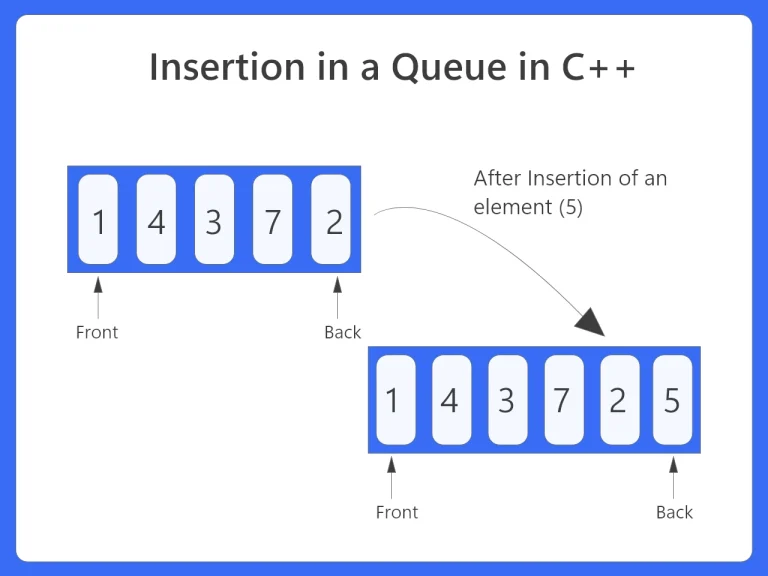Insertion in a Queue in C

How to insert an element in a Queue in C programming?
Insertion in a Queue in C is also known as enqueuing so to enqueue an element certain steps are followed which will be discussed in this article. Inserting an element in a queue is one the simplest operation that is performed on a queue which is FIFO – First in First out structure, i.e. the element added first (Enqueued) will go out of the queue first (Dequeued).
Learn more about Queue in C programming by clicking the button below:-
Step for inserting an element in a Queue in C
To insert an element in a queue that is for enqueuing we proceed using following algorithm:-
- Define the maximum size of queue and initialize front and rear as -1.
- In the main function we will initialize two variables that will store the data and the size of the queue.
- Accept the data that we want to enter in a queue using a for loop.
- After accepting the data use enqueue() function to insert the data in a queue.
- In this function return queue id full , if the value of rear is equal to max-1.
- Else increase the value of rear by 1.
- After this insert the data that we have accepted earlier.
- Now display the data of the queue using a disp() function.
- In this function if the value of front is equal to -1 then it means list is empty.
- Else initialize a for loop from front to rear and print the data that queue is holding.

Algorithm for enqueuing in C
As we know that Queue is a FIFO type data structure so we will be using following algorithm for insertion of an element in a Queue :-- IF (REAR==MAX-1)
- RETURN QUEUE FULL
- ELSE
- REAR+REAR+1
- QUEUE[REAR]=DATA
- IF(FRONT== -1)
- FRONT = 0
Code for inserting an element in a queue in C (Enqueuing)
Run
#include <stdio.h>
#include <string.h>
#include <stdlib.h>
#include <stdbool.h>
#define MAX 6
int intArray[MAX];
int front = 0;
int rear = -1;
int itemCount = 0;
int peek ()
{
return intArray[front];
}
bool isEmpty ()
{
return itemCount == 0;
}
bool isFull ()
{
return itemCount == MAX;
}
int size ()
{
return itemCount;
}
void enqueue(int data)
{
if (!isFull ())
{
if (rear == MAX - 1)
{
rear = -1;
}
intArray[++rear] = data;
itemCount++;
}
}
int dequeue()
{
int data = intArray[front++];
if (front == MAX)
{
front = 0;
}
itemCount--;
return data;
}
int main ()
{
enqueue (3);
enqueue (5);
enqueue (9);
enqueue (1);
enqueue (12);
enqueue (15);
if (isFull ())
{
printf ("Queue is full!\n");
}
int num = dequeue ();
printf ("Element removed: %d\n", num);
enqueue (16);
enqueue (17);
enqueue (18);
printf ("Element at front: %d\n", peek ());
printf ("----------------------\n");
printf ("index : 5 4 3 2 1 0\n");
printf ("----------------------\n");
printf ("Queue: ");
while (!isEmpty ())
{
int n = dequeue();
printf ("%d ", n);
}
}
Output
Queue is full! Element removed: 3 Element at front: 5 ---------------------- index : 5 4 3 2 1 0 ---------------------- Queue: 5 9 1 12 15 16



Login/Signup to comment